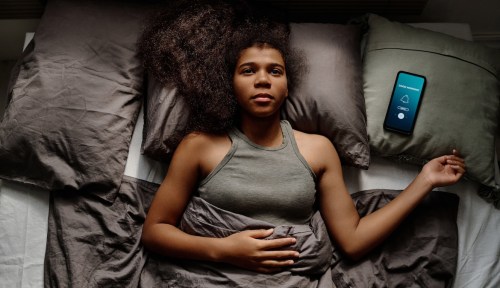It is a truth universally acknowledged that 4 a.m. is the absolute worst time to wake up in the middle of the night. Well, maybe not, but if you’ve ever found yourself wide awake and Googling “why do I wake up before my alarm,” in a restless fugue state with morning birds chirping outside your window, know that you’re not alone. According to the experts, there are a ton of reasons why you might be waking up earlier than your alarm: ranging from the fact that you’re already rested (the best case scenario, TBH), to changes in cortisol levels, to sleep disorders, to environmental factors.
Experts in This Article
founder at Optimal Circadian Health
board-certified behavioral sleep medicine specialist, sleep expert at Hatch, and author of Hello Sleep
clinical psychologist and founder of NYC Sleep Doctor
board certified sleep medicine physician, director of sleep medicine for the division of pulmonary, critical care, and sleep medicine at UW Medicine, and founder of the UW Medicine Sleep Center
To find out more, we asked a variety of sleep experts to break down exactly why you may be waking up before your alarm—and what to do about it.
Why do I wake up before my alarm? 8 possible reasons
Next time you catch yourself groggily typing “why do I wake up before my alarm” into your phone, look no further. We asked the experts for top reasons you might be waking up before your alarm.
1. Your cortisol levels are spiking
One possible reason you might be waking up before your alarm could be cortisol spikes, explains Dylan Petkus, MD, MPH, MS, founder at Optimal Circadian Health. “Cortisol, often referred to as the ‘stress hormone’ naturally starts to increase in the early morning hours to help prepare your body for the day. If you’re particularly stressed or excited, your cortisol levels might spike a little earlier, acting like an internal alarm clock that wakes you up before your actual alarm,” says Dr. Petkus.
“Cortisol, often referred to as the ‘stress hormone’ naturally starts to increase in the early morning hours to help prepare your body for the day.”—Dylan Petkus, MD, MPH, MS, founder at Optimal Circadian Health
2. You’ve got a big day ahead of you and you’re nervous
Another reason you might be up at 6 a.m. wondering “why do I wake up before my alarm” could be due to the anticipation of a change in routine, says Dr. Petkus. “If you have something out of the ordinary planned—like a big meeting or an early flight— your brain may be on high alert, rousing you from sleep earlier than usual.”
3. You’re getting enough sleep
If you’re waking up mere minutes before your alarm, this could mean your wake time is aligned with your natural circadian rhythm. This best-case scenario of simply having gotten enough sleep may be the case if you wake up feeling well-rested.
Waking up much earlier than an alarm could mean you’re simply trying to sleep for longer than what you need. Throughout the day, the need for sleep builds; the homeostatic sleep drive, which regulates the need for sleep, accumulates as you go about the day; it’s highest before you fall asleep, and lowest after you wake up after a night of rest. “It’s possible that you’re waking up earlier because you’ve fulfilled your sleep need,” says Vishesh K. Kapur, MD, a board certified sleep medicine physician who is founder and director of the UW Medicine Sleep Center and Director of Sleep Medicine for the Division of Pulmonary, Critical Care, and Sleep Medicine. In this case, it could be worth trying to shift your routine to go to bed and wake up earlier to hit that sweet spot.
That said, he caveats this is likely only plausible for folks who regularly get at least seven hours in bed, given that adults generally need between seven and nine hours of sleep per night. (And, he adds, “that’s unusual in our society because most people are not giving themselves enough time in bed.”)
4. Sleep disorders, like sleep apnea and insomnia
Earlier-than-ideal rising could also be an effect of a sleep disorder. One possibility is early-awakening insomnia, which, according to sleep psychologist Jade Wu, PhD, sleep advisor for Mattress Firm, is one of the tougher forms of insomnia to treat. In this case, “people want or need to sleep more, but something is waking them up early, and they’re having trouble getting back to sleep before their night is really done,” she says.
According to Dr. Kapur, the breathing pauses that come with obstructive sleep apnea, could also be the culprit of waking up earlier than you want. If you suspect you may be dealing with a sleep disorder, it’s best to see the care of a trained professional.
5. Mood issues like depression, anxiety, and stress
Mood disorders, which encompass depression, anxiety, and stress, can be at play here, too. Disturbed sleep and depression are especially closely linked. “Waking up too early in the morning and not being able to get back to sleep is kind of a classic presentation for depression,” says Dr. Kapur. Certain SSRIs (selective serotonin reuptake inhibitors), medications commonly prescribed as antidepressants, may have a negative effect on REM-stage sleep1, the last stage of sleep that takes place closer to most peoples’ morning. One possible result? Waking up before your alarm.
Anxiety and stress, which affect sleep, may also lead to early rising. According to both Dr. Wu and clinical psychologist and founder of the NYC Sleep Doctor Janet K. Kennedy, PhD, the sympathetic nervous system activates the body’s fight or flight response when you experience stress, which keeps you activated and ready to handle perceived threats. This is the opposite of the relaxed, soothing state that welcomes sleep. If you regularly operate in this mode during the daytime, it can carry over into the nighttime, too, making it tougher to get to sleep and stay sleeping.
6. Alcohol consumption
Dr. Kapur also adds that drinking alcohol can disrupt your sleep, which may contribute to waking up earlier than your alarm. Often alcohol can lead to disturbance in the middle of the night rather than toward the end, but this varies from person to person, depending on how “your body metabolizes it2,” he says.
7. Jet lag
Factors that throw off your circadian rhythm, like jet lag or sleeping late on the weekends (which is akin to giving yourself jet lag), can also contribute to this. “If your circadian rhythm is confused, then it might wake you up extra early, even when you don’t need to because it thinks it’s already daytime when it’s not,” Dr. Wu says. If you can, aim for a consistent bedtime.
8. Environmental factors
Environmental factors like light, sound, temperature—even the comfort of your sleep surface, Dr. Kapur says—can contribute to a pre-alarm wake time. Practicing good general sleep hygiene habits can help. To address these, he suggests keeping a sleep log and trying out different remedies to see if you’re able to sleep longer in the mornings. For example, try wearing an eye mask if light pollution is an issue. Here are some key environmental factors to consider:
Light: Light, artificial and otherwise, has a powerful effect on the circadian rhythm; keeping the room where you sleep dark signals that you should remain asleep. To create darkness, wear an eye mask or install blackout shades in your room.
Sound: Noise pollution, which may be more common in cities, can negatively affect your sleep, too. To combat this, Dr. Kapur suggests wearing ear plugs.
Temperature: Cool temps—specifically between 60°F to 67°F—are key for restful, fulfilling sleep. Like light, temperature affects the circadian rhythm. To combat overheating, opt for bedding, mattresses, and sleepwear in breathable fabrics that “prevent you from being enveloped in your own heat,” Dr. Kennedy says. Think: natural fibers like cotton, linen, and bamboo.
How to fall back asleep if you’ve woken up too early
Waking up before your alarm can be a stressful event in and of itself. When this happens, the very idea of missing out on sleep can make it harder for you to get back to bed, Dr. Kennedy says. This negative cycle can keep you from sleeping well and lead you to accumulate sleep debt.
It sounds tough, but try not to worry if this happens because stressing will make falling back asleep tougher. If you find yourself in this situation and unable to fall back asleep after a couple minutes, Dr. Kennedy suggests getting out of bed and trying to do a quiet activity to calm down, like reading a book. Go in a different room and think about a detailed memory or scenario to distract yourself, “really challenging yourself to remember details to take your mind away from the anxious thoughts that keep you awake,” she says. Avoid your phone, which emits blue light that can keep you awake. When you feel ready to sleep, try again.
Why would someone wake up after their alarm?
If you find that you wake up after your alarm, it could be due to being deep in sleep inertia, as Dr. Petkus explains. “It’s like trying to move through quicksand; your brain is sluggish and the alarm isn’t enough to pull you out immediately,” he adds.
Of course, being overly tired is another obvious reason you might wake up after your alarm, thanks to sleep deprivation from previous nights, Dr. Petkus adds. In this case, your body might try to recover from sleep deprivation, “by keeping you in a deeper sleep and ignoring the alarm.
What are some reasons people might oversleep?
“If you’re not hearing your alarm, it might be because you’re in a state of deep sleep, where your brain is so focused on essential recovery that it filters out external sounds,” Dr. Petkus explains. In this case, it’s like imagining “your brain has put up a ‘Do Not Disturb’ sign to ensure it finishes critical repairs.” So, next time you wonder “why can’t I hear my alarm in the morning” — know that it’s possible your body is just using the time to finish your critical repairs. (Good luck telling your boss that though.)
Another possible reason for oversleeping may be circadian rhythm misalignment, as Dr. Petkus explains. In circadian rhythm misalignment, “your body clock is out of sync with your wake-up time, [so] your brain might prioritize finishing its sleep cycle over responding to the alarm.”
At what point should you just stay awake if you wake up before your alarm?
“If you wake up within 30 minutes of your alarm, then you should just stay awake,” advises Dr. Petkus, explaining that “if you go back to sleep that close to your alarm clock, then the chances are very high that you will wake up during a deeper stage of sleep.” Waking up during a deeper sleep stage could mean waking up even groggier, making the extra 30 minutes of shut eye not even worth it in the long run.
How did people wake up before alarm clocks?
Barring phone alarms and modern-day annoying alarm clock contraptions designed to physically get your butt out of bed, how did ancient humans figure out waking up without an alarm? “In ancient times, people relied on natural cues like the sunrise or environmental sounds, like birds singing or a rooster crowing, to wake up,” explains Dr. Petkus. It also helped that they “followed a more consistent routine, going to bed shortly after sunset and waking up with the dawn,” Dr. Petkus says, adding that “without artificial light, their circadian rhythms were naturally aligned with the day-night cycle, making waking up a smooth, natural process.”
Wichniak, Adam et al. “Effects of Antidepressants on Sleep.” Current psychiatry reports vol. 19,9 63. 9 Aug. 2017, doi:10.1007/s11920-017-0816-4
↩︎Colrain, Ian M et al. “Alcohol and the sleeping brain.” Handbook of clinical neurology vol. 125 (2014): 415-31. doi:10.1016/B978-0-444-62619-6.00024-0
↩︎
Sign Up for Our Daily Newsletter
Get all the latest in wellness, trends, food, fitness, beauty, and more delivered right to your inbox.
Got it, you've been added to our email list.











